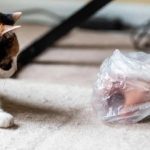As cat owners, we love our feline friends unconditionally, but we could all agree that dealing with the smell of their poop is not one of our favorite tasks.
It’s a common issue that many cat owners face, and it can be quite embarrassing when guests come over. However, did you know that the smell of your cat’s poop can indicate an underlying issue with their health or diet?
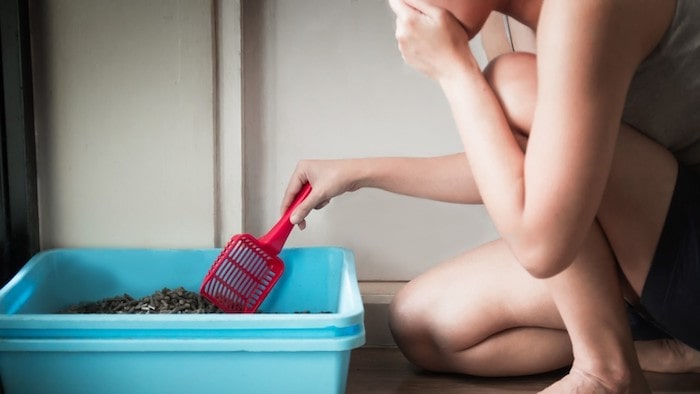
Understanding the root causes of bad-smelling cat poop is essential to maintaining your cat’s health and your home’s hygiene. In this article, we will explore common reasons why your cat’s poop may smell bad and provide tips on how to reduce the odor.
We will also discuss how to get rid of cat poop smell and offer solutions to help you manage the issue effectively. So, let’s get started on understanding why your cat’s poop smells so bad!
The Top Reasons Your Cats Poop Smells So Bad
There are several reasons why your cat’s poop may have a foul odor. Here are some of the most common causes:
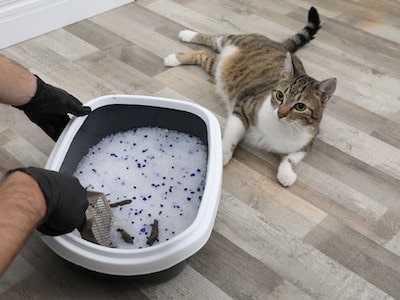
- Diet: The food your cat eats has a significant impact on the smell of their poop. Low-quality cat food containing fillers, preservatives, and artificial flavors can cause a foul odor in their poop. Additionally, sudden changes in diet can also lead to changes in poop odor.
- Digestive Issues: Various digestive issues, such as gastrointestinal infections or inflammations, can lead to smelly poop in cats. Some cats may have difficulty digesting certain types of food, leading to an unpleasant odor in their feces.
- Parasites: Parasites, such as worms or coccidia, can lead to smelly poop in cats. These parasites can disrupt the normal digestive process and cause diarrhea, which can increase the odor of their feces.
- Dehydration: If your cat is not drinking enough water, their feces may become dry and hard, making it difficult for them to pass stool. This can lead to constipation, which can cause a strong odor in their poop.
- Anal Gland Issues: Anal glands are small glands located on either side of your cat’s anus. These glands release a scent that helps cats mark their territory. However, if the glands become clogged or infected, they can cause a strong odor in their poop.
- Kidney Disease: Kidney disease is a common health issue in cats, and it can lead to a buildup of toxins in their body. This buildup can lead to a strong odor in their urine and feces.
- Liver Disease: Liver disease can also lead to changes in poop odor in cats. The liver plays a vital role in processing waste products, so if it’s not functioning correctly, this can result in foul-smelling feces.
- Pancreatitis: Pancreatitis is an inflammation of the pancreas, and it can cause a range of digestive issues in cats, including diarrhea and foul-smelling poop.
- Inflammatory Bowel Disease (IBD): IBD is a chronic condition that causes inflammation in the lining of the digestive tract. This inflammation can lead to a range of digestive issues, including changes in poop odor.
- Diabetes: Diabetes can lead to changes in poop odor in cats. The disease can cause a buildup of ketones in the body, which can lead to a distinct smell in their urine and feces.
How to Stop Your Cat’s Poop from Smelling Really Bad
Here are some tips on how to reduce your cat’s poop from smelling bad:
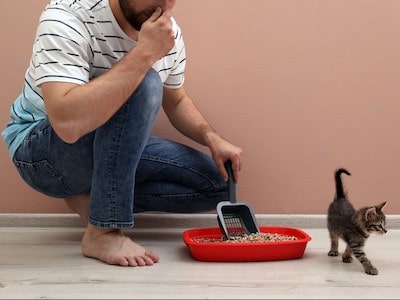
- Choose High-Quality Cat Food: Switching to high-quality cat food can help reduce the smell of your cat’s poop. Look for foods that contain real meat as the primary ingredient and avoid foods with artificial flavors and fillers.
- Provide Plenty of Water: Make sure your cat has access to plenty of fresh water to help keep their digestive system working correctly. If your cat is a picky drinker, consider providing a water fountain or adding water to their wet food.
- Keep the Litter Box Clean: Regularly scooping your cat’s litter box can help reduce the odor of their poop. Ideally, you should scoop the litter box at least once a day and replace the litter entirely every two to four weeks.
- Try Digestive Enzymes: Digestive enzymes are supplements that can help improve your cat’s digestion and reduce poop odor. Talk to your veterinarian about adding digestive enzymes to your cat’s diet.
- Consider Probiotics: Probiotics are beneficial bacteria that can help regulate your cat’s digestive system and reduce odor. Probiotics are available in supplement form or can be found in certain types of cat food.
- Provide Plenty of Exercise: Exercise can help keep your cat’s digestive system working correctly and reduce the likelihood of constipation, which can cause a strong odor in their poop. Make sure your cat has plenty of opportunities to play and exercise each day.
- Monitor Your Cat’s Health: Regular check-ups with your veterinarian can help identify any underlying health issues that may be causing your cat’s poop to smell bad. Early intervention is essential for managing many health conditions effectively.
How to Get Rid of Cat Poop Smell
As a cat owner, it’s inevitable that you’ll have to deal with the unpleasant smell of your furry friend’s poop from time to time. However, there are steps you can take to minimize and get rid of the odor. Here are some tips on how to get rid of cat poop smell:
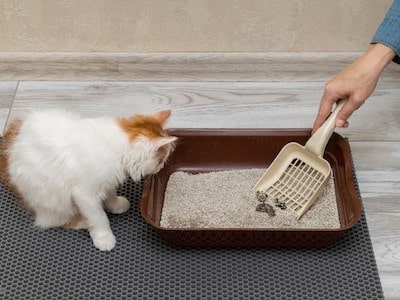
- Clean up immediately: As soon as your cat has done its business in the litter box or elsewhere, clean it up right away. The longer you leave it sitting around, the stronger and more pervasive the odor will become.
- Use an enzymatic cleaner: Regular cleaning products may mask odors temporarily but won’t eliminate them completely like an enzymatic cleaner designed specifically for pet messes will do.[1]
- Change litter frequently: If your litter box smells bad even after scooping out waste daily then try changing all or part of its contents at least once a week as old clumps can break apart releasing strong odors.
- Ventilate well: Open windows or use fans when cleaning up any messes because fresh air helps dissipate any lingering smells faster than limited airflow does otherwise this could lead bacteria growth which causes bad smell over time.
- Add baking soda – Sprinkle some baking soda on top of fresh kitty litter before adding waste especially if using clay-based litters; This simple hack absorbs moisture & neutralizes scent without harming cats’ health.
- Address diet changes – Sometimes dietary changes may be required due digestive issues leading smelly poops so consult vet about possible adjustments.
FAQs
Is it normal for cat poop to smell bad?
While cat poop may have a distinct odor, it shouldn’t have an overwhelming or extremely foul smell. If your cat’s poop consistently smells very bad, there may be an underlying issue that needs to be addressed.
Can I use regular cleaning products to clean up cat poop?
No, it’s best to use pet-safe cleaners to clean up cat poop as regular cleaning products may contain harmful chemicals that can be toxic to your cat.
Can my cat’s poop smell be caused by their litter?
Yes, the type of litter you use can affect the smell of your cat’s poop. Some litter types, such as scented litters, may exacerbate the odor of your cat’s poop. It’s best to use unscented, clumping litter.
Is it normal for my cat’s poop to be different colors?
Generally, a healthy cat’s poop should be brown in color. However, changes in diet or underlying health conditions can cause variations in color. If you notice any abnormal colors, such as red or black, it’s best to contact a veterinarian.
Well, It’s a Wrap
In conclusion, it’s important to keep an eye on your cat’s poop and its smell. While some odor is normal, an overwhelming or consistently foul smell could indicate an underlying health issue or poor diet.
Providing your cat with a healthy diet, plenty of water, exercise, and regular vet check-ups can help prevent any issues that may cause bad-smelling poop.
Keeping their litter box clean and using pet-safe cleaning products can also help maintain a clean and hygienic home. If you have any concerns about your cat’s poop or its smell, don’t hesitate to contact your veterinarian for advice and guidance.
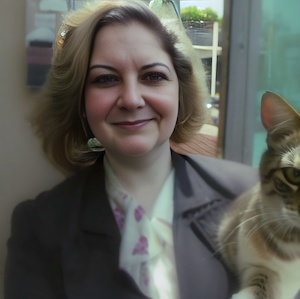
Charlene Pare is the founder of Cat Likes Best. She manages and strategizes the content published on this website. When she isn’t working, she enjoys exploring the city around with her Ameican Shorthair kitty–Moli. Being a technocrat and an avid cat lover, she also writes on pet tech products and some of the featured articles.


